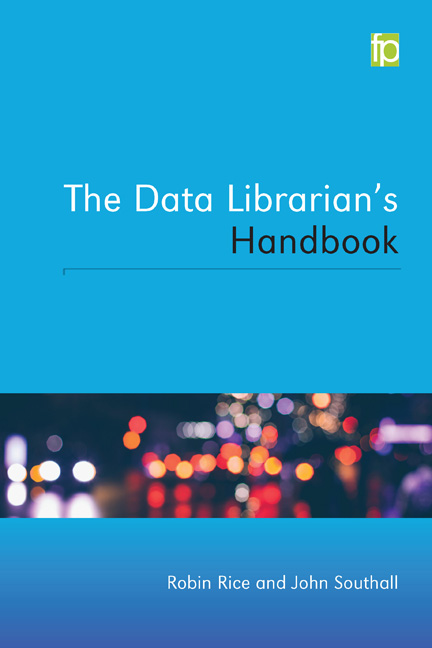Book contents
- Frontmatter
- Contents
- Acknowledgements
- Preface
- 1 Data librarianship: responding to research innovation
- 2 What is different about data?
- 3 Supporting data literacy
- 4 Building a data collection
- 5 Research data management service and policy: working across your institution
- 6 Data management plans as a calling card
- 7 Essentials of data repositories
- 8 Dealing with sensitive data
- 9 Data sharing in the disciplines
- 10 Supporting open scholarship and open science
- References
- Index
10 - Supporting open scholarship and open science
Published online by Cambridge University Press: 08 June 2018
- Frontmatter
- Contents
- Acknowledgements
- Preface
- 1 Data librarianship: responding to research innovation
- 2 What is different about data?
- 3 Supporting data literacy
- 4 Building a data collection
- 5 Research data management service and policy: working across your institution
- 6 Data management plans as a calling card
- 7 Essentials of data repositories
- 8 Dealing with sensitive data
- 9 Data sharing in the disciplines
- 10 Supporting open scholarship and open science
- References
- Index
Summary
The notable rise in the perceived value of data sharing across disciplines at the present time, as demonstrated in Chapter 9, probably has two distinct origins, which influence disciplines in tandem: the open access movement in its broadest sense; and data science, with its roots in computational methods and its embrace of the ‘data revolution’ (Hey, Tansley and Tolle, 2009). Both of these are having a positive and potentially powerful effect on data sharing and re-use. In this chapter we draw evidence from the broader area of scholarly communication in order to bring the discourse about the nature of data librarianship right up to the present, and peer into a possible future – one where technologies may be harnessed in ways that lead to an acceleration of not just data accumulation but knowledge creation and dissemination. This would benefit not just scientists and scholars but – through increased transparency and accessibility – potentially the full range of human endeavours. Concepts discussed in this chapter in particular may be usefully explored using the Open Research Glossary (www.righttoresearch.org/ resources/ OpenResearchGlossary) for those unfamiliar with them.
Going green: impact of the open access movement
The primary reasons for and against open access to digital content can be summed up in this famous quote by Stewart Brand, creator of the Whole Earth Catalog and The WELL, an early internet community network based in San Francisco: ‘Information wants to be free – because it is now so easy to copy and distribute casually – and information wants to be expensive – because in an Information Age, nothing is so valuable as the right information at the right time.’ The quote has been attributed to Brand at the first Hackers Conference, 1984 (www.rogerclarke.com/II/IWtbF.html).
This summarizes the conflict between those who wish to access information over the internet at the click of a button without paying for it and those who wish to build paywalls around commodified information products for profit. Libraries normally help users get over paywalls simply by paying for access to digital content on behalf of a community, sometimes getting the price lowered through negotiation, consortia-building, buying products in bundles and building collections as discussed in Chapter 4.
- Type
- Chapter
- Information
- The Data Librarian's Handbook , pp. 147 - 160Publisher: FacetPrint publication year: 2016



